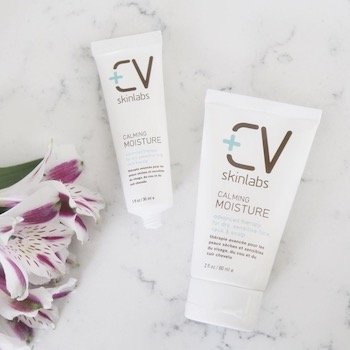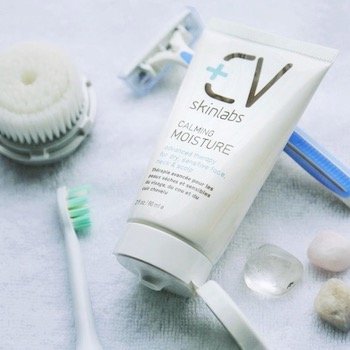
I’m a big fan of soothing skin care.
After losing my husband to cancer not long ago, I’ve used it to help me cope.
Not just because it feels good, though it does. And not just because it’s a good way to take care of myself during a difficult time.
But also because I’ve learned that grief can have significant negative effects on our skin.
Grief is a Mind and Body Experience
We’ve noted in previous posts that stress can cause skin problems like acne flare-ups, hives, rashes, redness, irritation, dry skin, and more.
Grief can cause stress, which can result in these same skin problems. But grief is often even more damaging because it involves so many emotions.
Indeed, grief is a whole-body experience. Harvard Health notes that the death of someone you love can affect “both mind and body,” potentially causing sleeplessness, loss of appetite, and general aches and pains. It’s also frequently associated with digestive problems, fatigue, a suppressed immune system (and increased vulnerability to infections), weight changes, and more.
You’ve probably heard of “broken heart syndrome.” Also known as stress cardiomyopathy, it occurs when someone experiences an emotionally stressful event that triggers sudden, intense chest pain. Other symptoms may include changes in heart rhythm and blood substances that are typical of a heart attack—yet there are no blocked arteries. Still, the syndrome can lead to short-term heart muscle failure.
So it’s clear that grief can have a very physical effect on us—and our skin.
 How Grief Affects the Skin and Why You Need Soothing Skin Care
How Grief Affects the Skin and Why You Need Soothing Skin Care
The main way that grief affects the skin is through stress.
In a 2015 study, researchers studied about 1,500 married individuals 65 and older to investigate how spousal loss and death were associated with levels of the stress hormone, cortisol, in the body.
The results showed that overall, stressful life events such as the loss of a loved one are associated with stress-related hormone levels (such as spikes in cortisol) for longer than researchers previously believed.
In other words, you may experience elevated cortisol levels for more than a week or two, which can have devastating effects on your skin.
Scientists have discovered an intricate relationship between stress and many skin diseases like eczema, rosacea, and psoriasis, as well as skin problems like acne and dryness. Cortisol and other stress hormones can increase inflammation in the skin. When these hormones remain high for long periods, they are also linked with impaired skin barrier function and premature aging.
Grief Can Increase Inflammation, Which Soothing Skin Care Can Reduce
Some studies have indicated that grief itself can also increase inflammation.
In 2019, for instance, researchers studied participants who had recently lost a spouse, to determine if there were any changes in inflammation. The results showed that those who were widowed had higher levels of inflammation than those in the general population, particularly if they were depressed.
Blood tests also showed that bereaved individuals who were experiencing more severe levels of grief also had higher levels of pro-inflammatory markers in their blood than those who had less grief severity. Those with more symptoms of depression also had higher levels of blood inflammation.
And you know that high inflammation leads to many skin problems, including breakouts, redness, irritation, rashes, eczema flare-ups, and more. Worse, inflammation compromises the skin’s outer barrier, making it more vulnerable to toxins in the environment and more likely to break down and age.
 How Soothing Skin Care Can Help You Cope with Grief
How Soothing Skin Care Can Help You Cope with Grief
There are many ways to cope with grief and to help yourself get through it. Some good general tips include taking daily walks, talking to a counselor, being gentle and patient with yourself, and trying to live each day one minute at a time.
I have found that returning my attention to nourishing skin care can give me a welcome respite from grief, while also helping me to feel just a little bit better. Here are some of the steps I use to put this into practice.
1. Set aside some time for soothing skin care.
For much of my life, even though I’ve always been in the beauty industry, I tended to hurry through my skincare routine. We are all busy and have places to go and things to do. Sometimes I was proud of myself for simply fitting my skin care routine in at all!
Now, I make a point at least a few times a week to take my time with my skin care. I may cleanse and tone and then wear a mask for 15 minutes, for example. Or I may simply take my time rubbing in my exfoliating solution.
It’s amazing the difference this simple change in attitude can make. Skin care becomes a way to slow down, relax, and breathe.
2. Breathe deeply while applying your skin products.
Deep breathing is a wonderful way to deal with stress and grief, but it can be difficult to take the time out to do it.
I now focus on my breath during my skincare routine. While cleansing, I’m breathing in and out slowly and evenly. Studies have shown how calming this can be, and I’ve experienced the benefits as my nerves are a little less frazzled afterward.
3. Focus on reducing inflammation.
Since both stress and grief cause inflammation, this is where you need to focus your skin care while you’re recovering.
I’m thrilled that our CV Skinlabs products were all formulated specifically to address inflammation. They all contain the exclusive Tri-Rescue Complex, which we created specifically to help reduce inflammation and protect the skin from environmental assaults.
Whenever I notice a little redness or irritation showing up, I’ll spray on some of our Rescue & Relief Spray to calm it down.
4. Moisturize well to reduce grief-related skin problems.
Dry skin is another of the very common reactions during grief and stress. As the outer barrier is damaged and compromised, the skin loses more moisture to the air and becomes dryer as a result.
I use both our Calming Moisture and Body Repair Lotion to counteract this effect, and I’m proud to say my skin is softer and smoother because of it. Both of these products have anti-inflammatory ingredients to help counteract the stress, then they have natural oils, antioxidants, and fatty acids to moisturize and protect, allowing that outer barrier to repair itself.
5. Get creative with your soothing skin care.
Sometimes when going through a very difficult period of grief, I find that adding a few caring details to my skincare routine makes me feel better.
I may light a candle with my favorite scent, for instance, and allow it to flicker nearby while wearing my hydrating mask. Or I like to turn on some soothing but uplifting music to help boost my mood while taking a soothing oatmeal bath.
You can get as creative as you like. Maybe you put a new picture in your bathroom where you usually apply your skin care products, add some new drapes over the window, or get a new floor rug to stand on. Perhaps a lighted mirror would be nice, or a special skin brush to help you exfoliate.
We often think of these things as being too self-indulgent, but when you’re grieving, you have to take care of yourself. Your body and mind are suffering, and it’s your responsibility to soothe that suffering and be there for yourself however you can be.
I still miss my husband terribly, but there are moments—such as when taking care of my skin—that I can return to myself and feel restored.
Have you found that soothing skin care helps you feel better?

